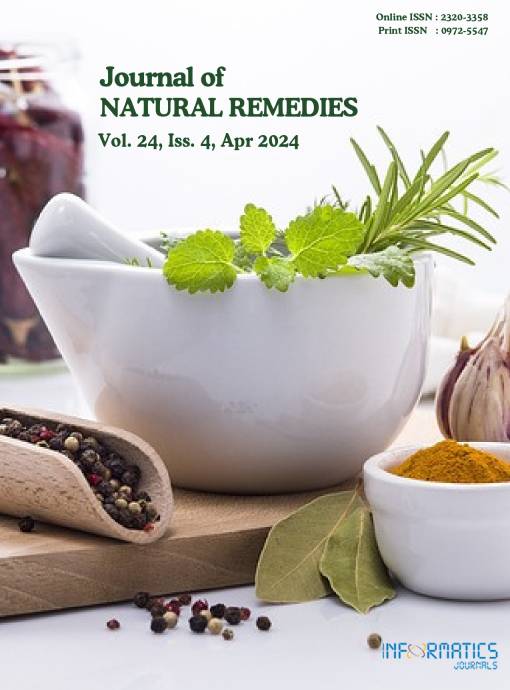Formulation and Evaluation of Amomum sublatum Leaf Oil Incorporated Pluronic Matrix Type Transdermal Patches in Percutaneous Absorption -Errata for this article is published under Volume 24, Issue 7, 2024
DOI:
https://doi.org/10.18311/jnr/2024/35519Keywords:
Amomum Leaf Oil, Box Behnken Model, Pluronic, USP 7 Dissolution ApparatusAbstract
A matrix type of transdermal patch formulations having different types of hydrophilic, hydrophobic polymer components Diclofenac potassium (Diclofenac K) served as the model drug and penetration enhancer for topical delivery in this research, employing the USP7 apparatus for dissolution studies. Transdermal patches loaded with Amomum sublatum leaf volatile oil (utilized penetration enhancer) were formulated using the solvent evaporation technique, incorporating varying amounts of pluronic F-127 and ethyl cellulose based on 15 formulations designed by the Box Behnken model. The prepared patches underwent evaluation for various physicochemical parameters, including tensile toughness, moisture content, and moisture uptake. In vitro diffusion studies were conducted using the USP7 apparatus dedicated to transdermal drug release investigations. The optimized formulation, F10, exhibited a drug release of 82% over 24 hours in the in vitro diffusion study. All the transdermal matrix-type formulations demonstrated satisfactory results, indicating that the developed matrix-type transdermal patch, containing different polymers and the A. sublatum leaf volatile oil penetration enhancer, holds potential for transdermal delivery in the treatment of pain and swelling.
Downloads
Metrics
Downloads
Published
How to Cite
Issue
Section
License
Copyright (c) 2024 Sudip Das, Bapi Ray Sarkar, Koushik Sen Gupta (Author)

This work is licensed under a Creative Commons Attribution 4.0 International License.
Accepted 2024-02-19
Published 2024-04-01
References
Das A, Ghosh A, Das S, Dey BK, Ghosh TK. 2013. Formulation and in vitro evaluation of transdermal patches of metformin hydrochloride using hydrophilic and hydrophobic polymer complex. Research J Pharm and Tech. 2011; 4(4):561-65.
Zhou MX, Shoudt D, Calderon G. Feng M. Application of USP apparatus 7 to in vitro drug release in scopolamine transdermal systems. Dissolution Technologies. 2007. p. 25-9. https://doi.org/10.14227/DT140207P25
Kashmira K, Harsha K. Film forming systems for topical and transdermal drug delivery. Asian J Pharm Sci. 2017; 12(6):487-97. https://doi.org/10.1016/j.ajps.2017.07.004 PMid:32104362 PMCid: PMC7032117
Jain SK, Gupta SP. Effective and controlled transdermal delivery of Metaprolol Tartarate. Ind J Pharm Sci. 2009; 67(3):346-50.
Das S, Sengupta, K. A comprehensive review on natural products as a chemical penetration enhancer. J Drug Deli Thera. 2021; 11(5):176-87. https://doi.org/10.22270/jddt.v11i5-S.5077
Biswas D, Das S, Mohanto S, Mantry S. Extraction, modification, and characterization of natural polymers used in transdermal drug delivery system: an updated review. Asian J Pharm Clini Res. 2020; 13(7):9-20. https://doi.org/10.22159/ajpcr.2020.v13i7.37756
Wahid A, Sridhar BK., Shivkumar S. Preparation and evaluation of the transdermal delivery system of etoricoxib using modified chitosan. Indian J Pharm Sci. 2008; 70(4):455-60. https://doi.org/10.4103/0250-474X.44593 PMid:20046770 PMCid: PMC2792537
Cho YH, Gwak HS. Transdermal delivery of ketorolac tromethamine: effects of vehicles and penetration enhancers. Drug Del Ind Pharm. 2004; 30(6):557-64. https://doi.org/10.1081/DDC-120037486 PMid:15285328
Patel A, Solanki R, Jain S, Dangi YS, Dubey N. Formulation, development, and evaluation of etoricoxib containing transdermal patches in arthritis management. Int J Res Analy Rev. 2018; 5(4):242-9.
Likhitha A, Vijetha AK. Formulation and evaluation of simvastatin transdermal drug delivery system. Saudi. J Med Pharm Sci. 2022; 8(10):527-35. https://doi.org/10.36348/sjmps.2022.v08i10.006
Telange DR, Nirgulkar SB, Umekar MJ, Patil AK, Pethe AM, Bali N. Enhanced transdermal permeation and antiinflammatory potential of phospholipids complex-loaded matrix film of umbelliferone: Formulation development, physicochemical and functional characterization. Euurop J Pharm Sci. 2019; 131:23-8. https://doi.org/10.1016/j.ejps.2019.02.006 PMid:30735820
Azad AK, Al-Mahmood SMA, Chatterjee B, Sulaiman WMA, Elsayed TM, Doolaanea, AA. Encapsulation of black seed oil in alginate beads as a ph-sensitive carrier for intestine-targeted drug delivery: In vitro, in vivo and ex vivo study. Pharmaceutics. 2020; 12:219-27. https://doi.org/10.3390/pharmaceutics12030219 PMid:32131539 PMCid: PMC7150899
Moawad FA, Ali AA, Salem HF. Nanotransfersomes-loaded thermosensitive in situ gel as a rectal delivery system of tizanidine HCl: Preparation, in vitro and in vivo performance. Drug Deli. 2017; 24:252-60. https://doi.org/10.1080/10717544.2016.1245369 PMid:28156169 PMCid: PMC8241079
Barkatiya M, Nema RK, Bhatnagar M. Designing and characterization of drug-free patches for transdermal application. Int J Pharm Sci Drug Res. 2010; 2:35-9.
Sharma N, Parashar B, Sharma S. Flourishing pharma industry with transdermal drug delivery system advantages and advancements for prospects. Pharmaceutics. 2012; 2(3):262-78. https://doi.org/10.35652/IGJPS.2012.33
Mandal S, Thimmasetty J, Ratan GN, Kilarimath BH. Formulation and evaluation of carvedilol transdermal patches. Int Research J Pharm. 2011; 2(1):237-45. https://doi.org/10.4103/2230-973X.100042 PMid:23119236 PMCid: PMC3482769
Darwhekar G, Jain DK, Patidar VK. Formulation an evaluation of transdermal drug delivery system of clopidogral bisulfate. Asian J Pharm Life Sci. 2011; 1(3):4-9.

 Sudip Das
Sudip Das









 0.35
0.35 24
24 0.161
0.161